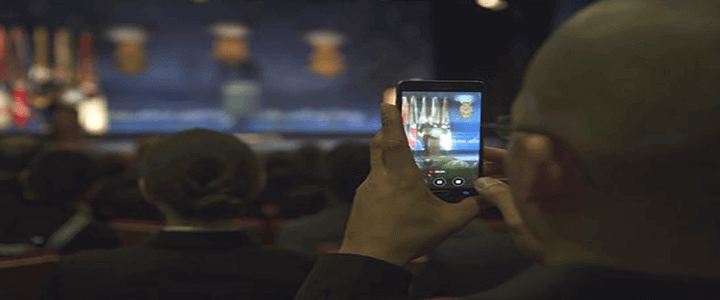According to numerous reports, Secretary of Defense James Mattis is considering banning personal cell phones from “the building.” Yes, the big, five-sided limestone-faced building where approximately 23,000 people work daily.
This would create what Washington Examiner defense correspondent Jamie McIntyre called “the world’s largest SCIF.” (For casual readers who are not among the cleared professionals this site serves, a SCIF is a Secure Compartmented Information Facility, a place for working with the most sensitive classified information, where outside electronic devices are strictly forbidden).
Mattis is considering the move as a reaction to the revelation that deployed troops’ exercise habits, and perhaps their patrol routes, were included in the heat maps compiled by a data mining company.
The idea is unworkable.
The sheer size of the Pentagon
Sure, other agencies do it. I’m told the CIA’s headquarters in Langley, Va. is cellphone-free. I know from experience that the FBI’s Clarksburg, W.V. facility that houses the Bureau’s fingerprint and DNA databases is a no-phone zone. I would assume that the National Security Agency’s headquarters at Fort Meade, Md. also prohibits personal cell phones.
But these facilities are dwarfed by the Pentagon.
I know the following information by heart, but you can fact-check me at the official Pentagon tours website. While only five stories high (with two underground levels in places) the Pentagon has three times as much floorspace (more than six million square feet) as the Empire State Building, and if it were flipped in its side, would be taller than the ESB, too. The building itself sits amid the 220-acre Pentagon Reservation; the center courtyard alone is five acres.
Roughly 23,000 military, government civilian, and contracted personnel work in the Pentagon. And unlike Langley, Clarksburg, or Meade, a large number of them use public transportation to commute. There are “only” 8,770 parking spaces on the reservation, enough for fewer than 40 percent of the occupants. The rest must either ride in an organized carpool, buy a parking spot somewhere close such as the Pentagon City Mall (on the other side of the interstate), “slug” — a curious Washington phenomenon where a passenger stands in line to wait for a car to pick up riders in order to use the interstate carpool lanes — or take public transportation.
The public transportation option is heavily encouraged for government employees. The Mass Transportation Benefit Program provides eligible employees with most if not all of the cost of taking busses or the subway to work each day. Immediately outside the Pentagon is a one off the largest bus terminals in the Metro area, Below that is the Pentagon Metro station, eighth-busiest station in the entire Metro system. In 2016, an average of 14,000 people boarded a train there each weekday.
What to do with the phones?
Plenty of places inside the Pentagon are already phone-free. Take a casual stroll down any corridor and you’ll see any number of offices with signs on the door warning about prohibited devices. These offices have lockers for visitors (even visitors from another Pentagon office) to put their phones in while they’re in a meeting.
I’ve even been in offices where a disembodied mechanical voice tells you that it has detected a cell phone signal, and to turn it off immediately. Personally, I was afraid of what would happen if I didn’t comply.
Putting cellphone lockers in every office is one thing, but preventing them from coming into the building altogether is quite another. You’re going to have to figure out what those people do with those phones, because Americans are undeniably tethered to our personal electronic devices. We’re dependent. Since people will not go without their phones during their commutes, there would need to be a way to secure them at the entrance.
Years ago, the fire alarm went off in the Pentagon, forcing an evacuation. Reentry was such a nightmare that they security staff opened the turnstiles and did their best to visually verify the ID of everyone coming back in. Otherwise, I think we might still be trying to get back in. I can only imagine how much worse entering the building would be if everyone had to stop to put their phone in a locker by the door.
Otherwise, the parking lots would become, as one online commenter put it, “cell phone shopping centers” for criminals, and those thousands of people who slug or ride the train would be without their phone for the entire day. That’s bit much to ask of our workforce, if you ask me.
I once heard the Army’s vice chief of staff throw out the idea of banning motorcycles from Army installations to cut down on the rising motorcycle deaths among recently returned soldiers. That idea would have been a nightmare to implement as well, and no one thought that “The Vice” really meant to go out and research the idea. He was throwing out one radical solution to the problem as a way of getting people to think seriously about ways to address the problem.
No one ran out and told the press that he wanted to ban soldiers from riding their motorcycles to work. Everyone understood what he meant. We can only hope Mattis made his comments in the same spirit.


